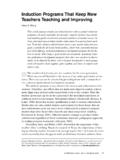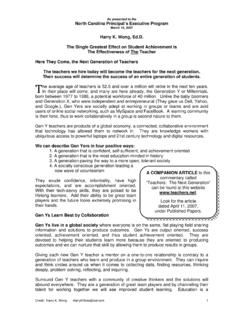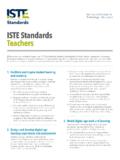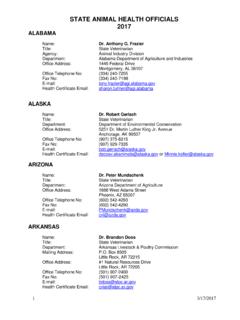Transcription of New Teacher Induction
1 3 New Teacher InductionThe Foundation for Comprehensive, Coherent,and Sustained Professional DevelopmentHarry K. WongInduction is a comprehensive process of sustained training and supportfor new teachers. The process of Induction has been growing success-fully for the past twenty years, and this chapter provides an opportunityto talk about where we are and where are we going with the training andretaining of new teachers. Let s begin with some startling facts on whynew teachers fail. Thirty-three percent of new teachers are hired after the school yearhas already started, and 62 percent are hired within thirty days ofwhen they start teaching (Kardos and Liu, 2003). Fifty-six percent of new teachers report that no extra assistance isavailable to them as new teachers (Kardos and Liu, 2003).
2 While 87 percent of the new teachers in a particular state said theyhad a mentor, only 17 percent said their mentors ever observed themteach (Kardos and Liu, 2003). Few teachers began teaching with a clear, operational curriculum inhand and even fewer received curricula that aligned with state stan-dards (Kauffman , Johnson, Kardos, Liu, & Peske, 2002). 1/27/2005 2:25 PM Page 41 Only 1% of beginning teachers currently receive the ongoingsupport that constitutes comprehensive Induction when they enterthe profession (Alliance for Excellent Education, 2004a).Now for the good news. There are some exciting state-of-the-art induc-tion programs that are providing the proper training and support for theprofessional development of effective teachers and that lead to lifelonglearning.
3 Switzerland, Japan, New Zealand, Shanghai (China), and France havecultures of lifelong learning that begin with Induction processes thatare comprehensive, coherent, and sustained. The Flowing Wells School District of Tucson, Arizona, has a struc-tured eight-year process that develops their new teachers fromnovices to expert teachers. Ninety-nine percent of the teachers in the Lafourche Parish Schoolsof Louisiana in 2002 successfully completed the performance-basedLouisiana Teacher Assistance and Assessment Program required forstate Teacher certification. In the Forsyth County Schools of Georgia, their Induction Academyis focused on the quality of student work, where they Work on theWork (WOW).
4 In the Carlsbad School District in New Mexico, the Induction programis focused on teaching teachers how to teach the required benchmarksand standards. The Homewood-Flossmoor High School District in Flossmoor,Illinois, has a lifelong professional development program calledHomewood-Flossmoor University. The Dallas Public Schools in Texas has a comprehensive new teacherinitiative that is comprised of learning opportunities for futureteachers in high school, student teachers, and beginning teachersand advanced studies for veteran teachers. Connecticut, California, and South Carolina have structured, multi-year Induction programs with specific protocols for Teacher effec-tiveness and student learning.
5 These comprehensive and organized Induction programs train andsupport teachers to focus on student AND MENTORINGARE NOT SYNONYMOUSThe term mentoringis often misused for must be clarified thatinduction and mentoring are not the same. The fact that the two terms areused interchangeably and synonymously does not make it and Designing Mentoring and Induction 1/27/2005 2:25 PM Page 42 Induction is a noun. It is the name given to a comprehensive,coherent, and sustained professional development process that is orga-nized by a school district to train, support, and retain new teachers,which then seamlessly progresses them into a lifelong learning program. Mentoring is most commonly used as a verb or adjective, because itdescribes what mentors do.
6 A mentor is a single person, whose basic func-tion is to help a new Teacher . Mentoring is not Induction ; it is a componentof the Induction terms mentoringand inductioncannot be used are important, but they are only one component of the inductionprocess. Mentors cannot replace or be the only form of Induction assis-tance. To do so would be to use a one-size-fits-all mentality that says amentor is all a new Teacher needs to become an effective many school districts, mentoring is carried out one-on-one, in iso-lation, with no coherence to any district or school curriculum, plan, goals,or standards, whereas good Induction programs are comprehensive, lastseveral years, have clearly articulated goals, and provide a structuredand nurturing system of professional development and support.
7 Or, asJohnson and Birkeland (2003a) quote a new Teacher in an Induction pro-gram, It was the perfect blend: caring, very structured, and a lot ofsupervision! Mentoring: Some Critical ReviewsBennetts (2001), Hawk (1986 1987) and Little (1990) report that there islittle empirical evidence to support specific mentoring Feiman-Nemser writes in her 1996 ERIC Digestarticle, TeacherMentoring: A Critical Review, that mentoring burst onto the educationalscene in the early 1980s, yet a review of twenty years of claims aboutmentoring reveal that few studies exist that show the context, content, andconsequences of mentoring. Thus more direct studies are needed aboutmentoring and its effects on teaching and Teacher significant reports expand on Feiman-Nemser s A research review written by Richard Ingersoll and Jeffrey Kralik(2004) states, While current research does not yet provide definitiveevidence of the value of mentoring programs in keeping newteachers from leaving the profession, it does reveal that there isenough promise to warrant significant further investigation.
8 2. Susan Moore Johnson and The Project on the Next Generation ofTeachers (2004) states, Although a few new teachers in our studysaid they would have been lost without their mentors, most providedlittle evidence that one-on-one mentoring offered much support. 43 New Teacher 1/27/2005 2:25 PM Page 433. A report from the Public Education Network (2004) on The Voice ofthe New Teacher says, Although the value of mentoring is indis-putable, the evidence of stand-alone mentoring as Induction pro-grams has been called into question. 4. Tapping the Potential: Retaining and Developing High-Quality NewTeachers,a report from the Alliance for Excellent Education (2004b)says, While mentoring is the most widely practiced component ofinduction, mentoring by itself is not enough to retain and developteachers.
9 Mentoring programs vary widely and may do little morethan ask mentors to check in with new teachers a few times persemester to chat. The use of mentoring alone, without the other components of induc-tion, is not supported by research as being a proven : The Focus Is on SurvivalThe issue is not mentoring. The issue is when mentoring is used as anisolated event. Studies have shown that mentoring does not teach teachereffectiveness; rather, it is designed to answer questions of survival. SusanMoore Johnson (2003), director of the Harvard Graduate School of Educa-tion s Project on the Next Generation of Teachers, said at an Associationfor Supervision and Curriculum Development (ASCD) presentation, Mentoring is all the rage.
10 There is some sort of deep hope on the part ofeveryone that if you get the right mentor, your life will be saved and youwill be the Teacher you remember. But the truth is that mentoring pairs sel-dom are anything but haphazard. They are driven by the schedule. Theyare often not pairs of people who really know the subjects that the indi-vidual is teaching. It is the belief of some people that all a new Teacher needs to succeed isa mentor. In a paper for WestEd, Britton, Raizen, Paine, & Huntley (2000;summarized in Wong, Britton, & Ganser, 2005) report that currently inmore than thirty states, the universal practice seems remarkably narrow:Mentoring predominates and often there is little more.











